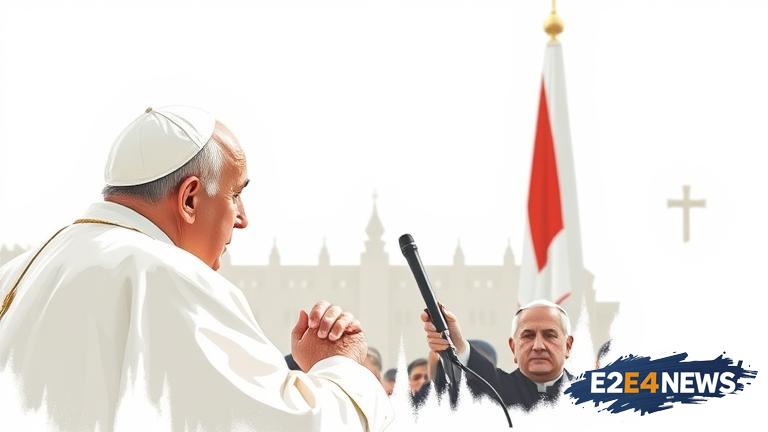The Helsinki Accords, officially known as the Helsinki Final Act, was a major diplomatic agreement signed on August 1, 1975, by 35 nations, including the United States, Canada, and all European countries except Albania and Andorra. The Accords marked a significant shift in international relations, as it acknowledged the post-war borders in Europe and committed signatory countries to respect human rights, fundamental freedoms, and sovereignty. The Pope’s recent comments on the Helsinki Accords highlight the importance of this agreement in promoting peace, stability, and cooperation in a region that was once divided by the Iron Curtain. The Accords consisted of three main baskets: security, economic cooperation, and human rights. The security basket focused on reducing the risk of conflict, while the economic cooperation basket aimed to increase trade and economic ties between East and West. The human rights basket, however, was the most significant aspect of the Accords, as it committed signatory countries to respect human rights and fundamental freedoms, including freedom of speech, assembly, and movement. The Helsinki Accords played a crucial role in ending the Cold War, as it created a framework for dialogue and cooperation between Eastern and Western blocs. The Accords also paved the way for the reunification of Germany and the dissolution of the Soviet Union. The Pope’s comments on the Helsinki Accords come at a time when international relations are once again under strain, with rising tensions between major world powers. The Pope emphasized the need for cooperation, dialogue, and mutual respect in international relations, citing the Helsinki Accords as a model for successful diplomacy. The Accords demonstrate that even in the face of significant differences and challenges, nations can come together to promote peace, stability, and cooperation. The Pope’s remarks also highlighted the importance of human rights and fundamental freedoms, which are essential components of a just and peaceful society. The Helsinki Accords have had a lasting impact on international relations, and their legacy continues to shape global politics today. The Accords have also inspired other international agreements, such as the Charter of Paris, which was signed in 1990 and aimed to promote democracy, human rights, and economic cooperation in Europe. The Pope’s comments on the Helsinki Accords have been welcomed by diplomats and scholars, who see the agreement as a significant milestone in the history of international relations. The Accords have also been recognized as a major achievement by the United Nations, which has praised the agreement for promoting peace, stability, and cooperation in Europe. In conclusion, the Helsinki Accords were a landmark agreement that marked a significant shift in international relations, promoting peace, stability, and cooperation between Eastern and Western blocs during the Cold War era. The Pope’s recent comments on the Accords highlight the importance of this agreement in promoting human rights, fundamental freedoms, and sovereignty, and serve as a reminder of the need for cooperation, dialogue, and mutual respect in international relations. The Accords continue to inspire international diplomacy and cooperation, and their legacy will be remembered as a major milestone in the history of international relations. The Pope’s remarks have also sparked a renewed interest in the Helsinki Accords, with scholars and diplomats re-examining the agreement’s significance and impact on international relations. As the world continues to face new challenges and uncertainties, the Helsinki Accords serve as a model for successful diplomacy and cooperation, reminding nations of the importance of working together to promote peace, stability, and human rights.
